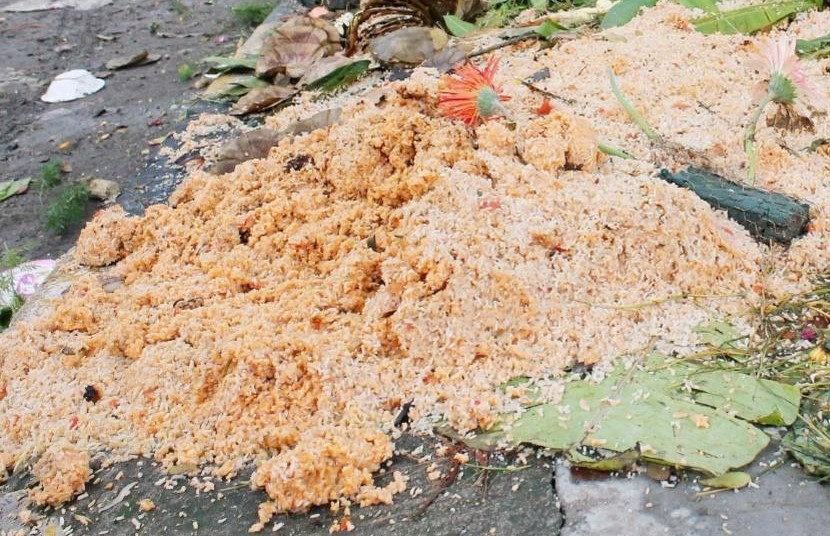Food Wastage: A Curse from Almighty
By: Javid Amin
In the realm of existence, every resource bestowed upon us carries an intrinsic value, a purpose, and a divine providence. Among these, none is more vital than the sustenance that nature bestows upon us, food, the wellspring of life itself. And yet, as we traverse the annals of history, we find instances where this divine gift is squandered, leading to scarcity and suffering. In the paradisiacal region of Kashmir, the mismanagement of resources, especially the misuse of food, paints a grim picture that calls for reflection and reform.
The Genesis of Scarcity: How Food Becomes a Casualty of Misuse
Kashmir, a place known for its ethereal beauty and bountiful landscapes, has always been considered a land of plenty. The valley has been celebrated for its rich harvests, especially the famed Kashmiri rice, which was once a symbol of abundance. However, as we delve into the past two decades, we are confronted with a disconcerting reality – the misappropriation and wastage of this precious sustenance.
Around two decades ago, the government of India provided substantial rice subsidies to the residents of Jammu and Kashmir. This initiative was intended to ensure food security and alleviate economic burdens. However, a disheartening transformation has occurred. The quantity of rice offered at a subsidised rate has seen a remarkable reduction over the years. This substantial reduction raises a multitude of questions about the disposition of these essential grains.
A Dwindling Lifeline: Unearthing the Alarming Rice Subsidy Cutbacks
Statistics are perhaps the most unimpeachable witnesses of this disheartening transformation. About twenty years ago, the government ensured that a substantial quantity of rice reached the residents of Kashmir at a subsidised rate, a benevolent measure that aimed to ease the lives of those who called the region home. Fast forward to the present, and we witness a staggering decline in the quantity of rice allotted to the people at subsidised rates.
The ramifications of this drastic reduction are immense. Families that once received a substantial quantity of rice to meet their basic dietary needs are now faced with dwindling rations. The apparent reasons for this diminishment include economic and political factors, but what’s undeniable is the escalating burden on the common populace, who now find themselves chasing bureaucratic procedures to secure their daily sustenance.
Chasing Daily Bread: The Saga of Struggling for Daily Consumption
The decline in subsidised rice is only the tip of the iceberg. The travails of the common Kashmiri in ensuring daily sustenance are relentless. People find themselves embroiled in a relentless cycle of attempting to secure their daily bread. This not only takes an emotional and psychological toll but also places immense pressure on their meager financial resources.
These individuals chase administrative procedures, often encountering perplexing red tape, only to secure a fraction of the rice they once received. This not only hampers their nutritional intake but also leaves them vulnerable to the volatility of the market. The result is a struggle for subsistence that seems far removed from the idealized vision of abundance.
A Resounding Reality: The Money Belongs to You, But Resources Belong to the Nation
The question that looms over this disheartening scenario is rooted in the concept of ownership. Monetary resources may belong to an individual, but the resources of sustenance, food, are the collective heritage of a nation. The availability and equitable distribution of food are the cornerstones of a prosperous society.
In developed countries, systems have been meticulously designed to curtail food wastage. From innovative storage and transportation methods to public awareness campaigns, these nations take food preservation seriously. Excess food is often redirected to those in need, rather than left to perish.
From Quran to Conscience: Lessons Against Food Wastage
The Quran, revered as a divine guide by billions, offers invaluable guidance on the sanctity of food. It admonishes against waste, urging stewardship and compassion. The Quranic verses remind us that food is a divine gift, meant to be cherished, shared, and preserved.
The Prophetic traditions further underline this reverence for food. The Prophet Muhammad, peace be upon him, is reported to have said, “Eat together and not separately, for the blessing is associated with the company.” This simple yet profound tradition highlights the importance of sharing meals and not allowing food to go to waste.
Echoes of the Past: Civilizations Erased for Squandering Divine Bounty
The annals of history reveal haunting accounts of civilisations brought to ruin through the wastage of divine bounty. The fabled tale of the people of ‘Ad, found in the Quran and Bible, serves as a stark reminder of the consequences of squandering divine gifts. This ancient community is believed to have faced divine retribution for their extravagant and wasteful behaviour.
In our quest for abundance, we must heed these ancient lessons. The earth’s resources are finite, and the misuse or waste of these treasures has the potential to unleash cataclysmic consequences.
The Wider Nexus: Beyond Food – Wasting Water, Air, and More
Food is not the sole victim of human neglect. Water, the very elixir of life, is misused and squandered in various parts of the world. Air, a free and vital resource, is poisoned by unchecked pollution. Ecosystems, which have sustained life for eons, are decimated through reckless exploitation.
This broader nexus of resource mismanagement is a global crisis. It demands urgent attention and a shift in collective consciousness. Only through such a transformation can we hope to avert the impending catastrophe.
In Conclusion: An Ominous Spectre and a Ray of Hope
The disconcerting reality of resource wastage, particularly the misuse of food in Kashmir, is an ominous spectre. It casts a long shadow over the welfare of the populace and underscores the urgency of reformation and sustainable practices.
However, there is a glimmer of hope. Every adversity carries within it the seeds of transformation. As we grapple with these pressing challenges, we have the opportunity to heed the lessons of history and to invoke a positive change. We can rekindle the awareness of our shared responsibility toward the resources that sustain us.
Through a collective shift in mindset, concerted efforts, and a commitment to the conservation and equitable distribution of resources, we can write a different narrative – one where sustenance is cherished, waste is minimized, and the divine gifts of the earth are stewarded with reverence.
The message is clear: the destiny of our world lies not in scarcity and suffering, but in the judicious use of the divine bounty that surrounds us. It is a call to awaken to our responsibility and to reshape the future – a future where resources are cherished, and waste is anathema.
As the Quran beautifully states: “And do not waste [resources] extravagantly. Indeed, He does not like those who waste [resources].”






